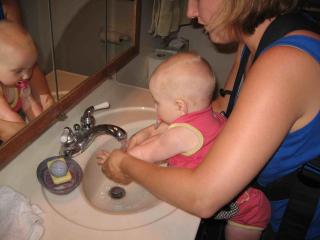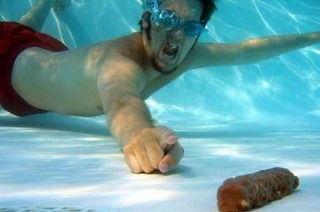As a dad of a couple of messy boys, I’ve changed diapers in weird situations: in parking lots, hockey arena restrooms, on a plane. But never on the table in a fast food restaurant.
According to Gawker and Consumerist coverage, Chad, a dad in the midwest, ripped off a nasty letter to Chipotle (who got it right) after a manager asked him and his wife to stop changing their son’s diaper on a table in the dining area.
Chad, the dad in this incident, admitted in his letter that changing a diaper in a place where people eat is “unsavory,” but he still feels the Chipotle staff showed an “inability/unwillingness to empathize with parents who find [the car] a less convenient alternative even on a beautiful day like yesterday, much less a subfreezing day as we undoubtedly will have in [this region] this winter.”
Typical Chad.
He went on to say that the employees’ horrified reaction toward a dirty diaper on a table—where, again, human beings typically consume food—tipped him off that they must not have kids of their own. If they don’t install changing tables, he says, he’ll be taking his business (and his baby’s business, obviously) to Qdoba.Hard to say which fast-food Mexican chain he’s actually threatening with that one.
A rep for the company sent this rather reasonable response to the complaining father:
I can completely understand that it’s a hassle to find a way to change your daughter, and agree, that there are simply no alternatives as convenient as an actual changing table. We are currently in the process of retrofitting locations with changing tables, but I understand that this is not a very timely solution. … As you can understand it might be disconcerting for other customers to see a child getting changed directly on the tables, and we want to provide all of our customers with an exceptional experience.


.jpg) Pools should also not allow non-potty trained children to be in them until further notice.
Pools should also not allow non-potty trained children to be in them until further notice. Our two-year old, Sorenne, has been reluctant to wash her hands lately. Today during a particularly messy diaper change, she reached down to see what was going on, got poop on her index finger, and decided to wipe it on my forearm saying, “Blech, poop yucky!”
Our two-year old, Sorenne, has been reluctant to wash her hands lately. Today during a particularly messy diaper change, she reached down to see what was going on, got poop on her index finger, and decided to wipe it on my forearm saying, “Blech, poop yucky!”

 While visiting family in Burlington, Vermont, the gang went out for lunch at Al’s Kitchen, where a young father pulled a
While visiting family in Burlington, Vermont, the gang went out for lunch at Al’s Kitchen, where a young father pulled a  Mary has an entertaining, R-rated version of the event
Mary has an entertaining, R-rated version of the event .jpg) The
The  Swim diapers released about 50% of the microspheres within one minute. A vinyl diaper cover placed over a disposable swim diaper slightly improved performance. Still, over 25% were released into the water within two minutes.
Swim diapers released about 50% of the microspheres within one minute. A vinyl diaper cover placed over a disposable swim diaper slightly improved performance. Still, over 25% were released into the water within two minutes.